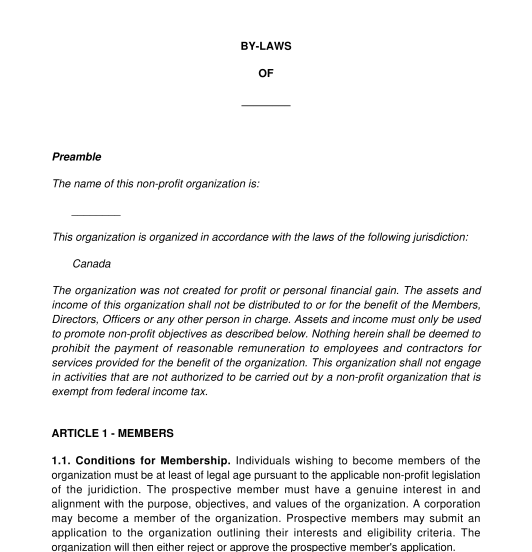 11/09/2025
11/09/2025

Answer a few questions and your document is created automatically.

Your document is ready! You will receive it in Word and PDF formats. You will be able to modify it.

 11/09/2025
11/09/2025
 Word and PDF
Word and PDF
 6 to 9 pages
6 to 9 pages
By-laws for non-profit organizations are internal, private documents that govern the organization's affairs. The by-laws provide rules and functions for its members, directors and officers. By-laws are consistent with the law, and may include additional details that the law doesn't specify.
By-laws can be read with the letters patent (the documents that create the corporation), but they rank in priority over the by-laws. Unlike the by-laws, letters patent are external, public documents available for viewing in government databases.
Depending on the jurisdiction, bylaws may be required for a non-profit organization, including in British Columbia, Saskatchewan, Yukon, Northwest Territories, and Nunavut. Even if by-laws are not mandatory in other jurisdictions, they are an important document to have because the by-laws specifically cover the rules that must be followed and contain the processes for making decisions, attending meetings, providing notice of meetings, elections, and more.
The purpose is to regulate the affairs of the organization. Without bylaws in place, the key players in the organization will not be able to access the rules governing the organization.
The Articles of Incorporation (or letters patent for non-profits) are the documents that create the corporation. On the other hand, the corporate bylaws are documents that can be created after the articles of incorporation have been filed with the government. The bylaws can be read with the articles of incorporation (the documents that create the corporation), but the articles rank in priority over the bylaws. Unlike the bylaws, articles of incorporation are external, public documents available for viewing in government databases.
The By-Laws for Non-Profit Organizations must cover all the basic information needed to define the operational structure of a non-profit organization. The by-laws cover the following key areas:
The by-laws also contain the rules of the organization and describe the activities of the non-profit, such as annual meetings, the composition of the board of directors and voting procedures.
To be able to sign bylaws, the corporation must first be created and validly existing. The members must have appointed the directors in the organizational minutes of the corporation. Once these initial stages have been completed, the directors and members may sign the bylaws.
The bylaws are created by the directors and submitted to the members for approval. Only the directors and members have the authority to sign the by-laws. In other words, an employee or an agent cannot sign the bylaws unless they are aslo a director or member of the corporation with valid rights to sign.
By-Laws for Non-Profit Organizations typically last for the lifetime of the corporation. In other words, until the members decide to dissolve the corporation, or until it is wound-up, the bylaws will remain in place. The bylaws may evolve overtime and the directors may make amendments to the bylaws.
Once this document is filled out, it should be signed by the directors and confirmed by a majority of the members and immediately placed in the organization's records, usually the minute book (a binder with documents of the organization). The minute book can be stored physically, electronically, or both. The members may sign a separate resolution confirming (or rejecting) the by-laws.
The creation and structure of not-for-profit organizations is generally governed by provincial, territorial and federal law. Organizations must also meet specific requirements under the Income Tax Act, R.S.C. (1985), c. 1 (5th Supp.), the Excise Tax Act, R.S.C. (1985), c. E-15, c. E-15, the Customs Act, R.S.C. (1985), c.1 (2nd Supp.) and any other Act under the authority of the Minister of National Revenue.
The applicable statute depends on where the incorporation of the non-profit took place. The pieces of legislation governing By-laws for Non-Profit Organizations are as follows:
You fill out a form. The document is created before your eyes as you respond to the questions.
At the end, you receive it in Word and PDF formats. You can modify it and reuse it.
By-Laws for Non-Profit Organizations - Sample, template
Country: Canada (English)